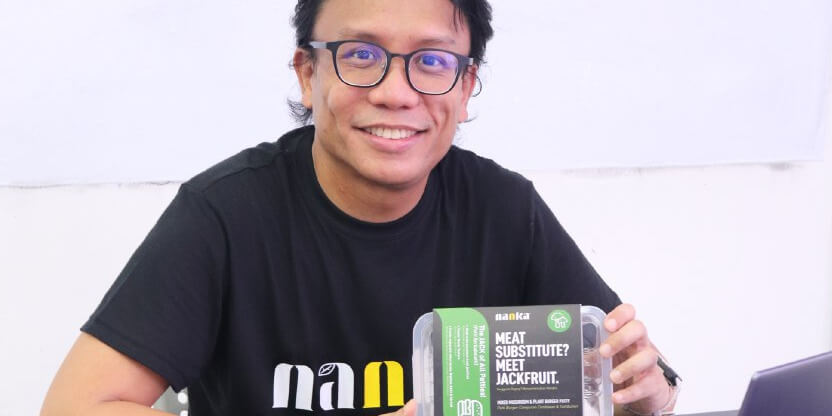Jackfruit meat-substitute maker Nanka to introduce plant-based meat cubes, sausages, and nuggets in 2022.
Malaysian food tech startup Nanka plans to expand its plant-based meat range following the success of its jackfruit and mushroom burger patties, securing halal certification for its 100% plant products.
The company - based in Petaling, near Kuala Lumpur - is looking to introduce plant-based meat cubes, sausages, and nuggets, as well as mini plant-based patties for children by the first quarter of 2022, Ahmad Syafik, co-founder of Ira Noah, Nanka’s parent company, told Salaam Gateway.
The halal-certified plant-based options will help Nanka expand sales within its burger patty range, which includes two hybrid versions, made with a combination of 70% jackfruit with 30% either chicken or beef, for which the company has also secured halal certification. Its halal 100% plant-based patty is made from 70% jackfruit and 30% oyster mushrooms.
“We’ve been selling the flexitarian patty for two years. Earlier this year, we launched the 100% plant-based patty, and it’s been growing faster than the mixed version,” said Syafik. “We’ve been seeing a good 4-5% month-on-month growth. Right now, as it stands, we’re doubling sales that we’ve gotten last year, so we’re seeing a lot of traction.”
Like most plant-based protein manufacturers supplying the Malaysian market, Nanka chose to get halal certification as a way of gaining Muslim consumer confidence.
“Even though our 100% plant-based burger is meat free, we still applied for halal certification to show customers as a stamp of quality and ethical practices, translated into the products,” the co-founder told Salaam Gateway.
Nanka’s plant-based range has been certified by the Malaysian Islamic Development Department (JAKIM) agency, which regulates one of the toughest certifications worldwide, according to Syafik.
Every ingredient that goes into the products has to be halal certified, he noted: “We have 35 ingredients, so we had to list them all and get 35 certificates. And they didn’t just look at whether we have permissible ingredients; they visited the facility, looked at the operational procedures, documentation processes, how the staff was being treated, and whether they got days off.”
“Then they looked at our marketing and whether we were misleading consumers; they checked many angles. It’s tough and takes time. It took us almost two months to get ready for the inspection. Fortunately, we have a halal consultant on our team helping us out.”
Nanka will soon submit its new plant-based meat cubes for food analysis and is in the process of designing the packaging.
“Meat cubes are something that Malaysians and Indians typically like to chuck in meat dishes like curries. We want to offer an alternative to meat cubes so you can prepare various Asian dishes, heritage recipes and home-cooked meals,” said Syafik.
The company also plans to launch mini plant-based patties for children between the ages of two and five, to help introduce a high-fibre diet into their daily consumption, which will also be halal certified.
“What we’re trying to do, is go on the road less travelled like into schools and commercial kitchens. This is where we want to make a difference in the sense that we’re trying to inculcate the awareness of having a more conscious diet from a young age.”
There are also plans to introduce a ready-to-heat range of plant-based meals besides the frozen range, according to Syafik.
“By the first quarter of next year, we will have those products ready, and they will all be halal certified. We want people to be able to access our products as much as possible,” he said.
Plant-based products have a lot of potential in Malaysia, which has a population of 32 million. A survey of 4,600 people conducted by data company Statista in 2019, found that the majority of respondents had tried plant-based milk, and half had tried non-dairy cheese, meat substitutes, and plant-based desserts, indicating consumer readiness to try new and novel food products.
While Malaysians are familiar with jackfruit in its ripened form, eating it on its own or using it to make sweet snacks, it is unripe jackfruit that the plant-based market is after.
Jackfruit benefits from having a cellular structure and fibre content that are comparable to meat. Because of this fibrous, stringy texture, it hardly needs processing or alteration, according to the Journal of Food Research.
“A lot of processing goes into creating plant-based meat. We’re proud to say that we don’t have those fancy hi-tech formulations or hard-to-pronounce ingredients that go into some products,” said Syafik. “We keep it minimally processed, to the point that if you know the process and ingredients that go into it, you can recreate your own plant-based meat at home.”
© SalaamGateway.com 2021 All Rights Reserved

